Caryn
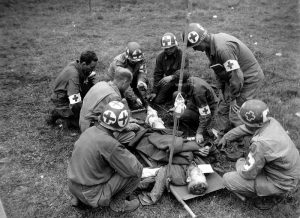 Wearing a white armband with the red cross signifying that a soldier is a medic, did not guarantee their safety in combat. Bombs raining down from the sky could not distinguish the target as a medic when they fell, nor could bullets shot from the guns of the enemy. Nevertheless, they ran into the line of fire at the cry of, “Medic!!” Of course, they were scared. They knew that, at that moment, their life expectancy was about one minute. They had to dodge the bullets and bombs just to do their job. Most of us can’t imagine the fear they must have felt. Still, in that moment, they were the only thing standing between the wounded soldiers and certain death. Soldiers were stunned to see a medic running through the machine gun fire just to put a tourniquet on the battered arm of the wounded soldier. The medic risked his own life to save the lives of others.
Wearing a white armband with the red cross signifying that a soldier is a medic, did not guarantee their safety in combat. Bombs raining down from the sky could not distinguish the target as a medic when they fell, nor could bullets shot from the guns of the enemy. Nevertheless, they ran into the line of fire at the cry of, “Medic!!” Of course, they were scared. They knew that, at that moment, their life expectancy was about one minute. They had to dodge the bullets and bombs just to do their job. Most of us can’t imagine the fear they must have felt. Still, in that moment, they were the only thing standing between the wounded soldiers and certain death. Soldiers were stunned to see a medic running through the machine gun fire just to put a tourniquet on the battered arm of the wounded soldier. The medic risked his own life to save the lives of others.
The medics received the same combat training as the other infantrymen, but they didn’t carry a weapon. Imagine finding yourself in the middle of a war zone and all you have with you is a first aid kit. The idea, I’m sure, is that the soldiers will protect the medics, but can they really. The soldiers are fighting for their own lives. It’s not that they don’t want to protect the medics or their fellow soldiers, but rather that they can’t. They are too busy fighting off the enemy.
Often the men who went in as medics were volunteer conscientious objectors. I don’t know if they realized that a conscientious objector didn’t get out of the war, but rather just didn’t get a gun…for shooting or for protection. Something like that would make me reconsider conscientious objection. I’m not one that wants to kill people, but self defense is another thing entirely. When medics went through their training, the other soldiers were rather negative toward them, often calling them “pill pushers,” but all their disdain disappeared when they saw the medics in action on the battlefield. The medics were right there beside the soldiers in the 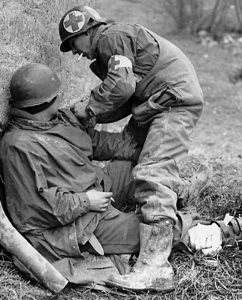 foxholes. They were with them as they advanced during offensives. Then, while the fighting raged, they went between lines attending to the wounded. They disregarded the danger to themselves, and did their duty. The tools of their trade were limited. Often their examination would be followed with a tourniquet and a morphine injection, before cleaning the wound and sprinkling sulfa powder on it. Then they bandaged the wound and dragged the wounded soldier off the field…all in a matter of minutes or less.
foxholes. They were with them as they advanced during offensives. Then, while the fighting raged, they went between lines attending to the wounded. They disregarded the danger to themselves, and did their duty. The tools of their trade were limited. Often their examination would be followed with a tourniquet and a morphine injection, before cleaning the wound and sprinkling sulfa powder on it. Then they bandaged the wound and dragged the wounded soldier off the field…all in a matter of minutes or less.
Medics were protected by the Geneva Convention, but the Red Cross that was displayed on their helmet, was a practice that was abandoned during the Vietnam War. Believe it or not, the cross on the helmet became a target for the enemy. By then, medics also had weapons…just for protection, but my guess is that they were probably glad they had it, but not so in World War II. Armed or not, many were severely injured or killed while attending to the wounded, and that made them a unique kind of hero.
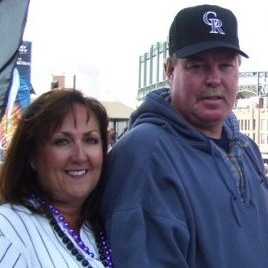
 My sister, Alena Stevens has always had a great sense of style…especially when it came to interior decorating. Her ability to somehow see something in a room that almost speaks to her. She can just picture what the room should look like before she even starts decorating the room. I was always impressed that she could do that, because I practically have to copy something out of a magazine or webpage to get the room to look good. Alena just sees it all in her head. It must be her creative side.
My sister, Alena Stevens has always had a great sense of style…especially when it came to interior decorating. Her ability to somehow see something in a room that almost speaks to her. She can just picture what the room should look like before she even starts decorating the room. I was always impressed that she could do that, because I practically have to copy something out of a magazine or webpage to get the room to look good. Alena just sees it all in her head. It must be her creative side.
I was always impressed with the beautiful rooms Alena could create. Her house always feels warm and homey. What I didn’t expect, was when a house spoke to Alena. No, I’m not being creepy, but Alena saw the house she and her husband, Mike now own, after it had already been sold. At that time she told Mike that if it ever went 
 on the market again, she wanted it. After a few years, the house did go on the market again, and they jumped at the chance to buy it. The house was everything Alena had dreamed it would be. She set about decorating it, and the house seemed to glow under her loving care.
on the market again, she wanted it. After a few years, the house did go on the market again, and they jumped at the chance to buy it. The house was everything Alena had dreamed it would be. She set about decorating it, and the house seemed to glow under her loving care.
Over the years, Alena had changed the décor of the home, and each time it is just as lovely as the time before. When we went through our parents things, after their passing, she incorporated the things she got into lovely areas of tribute to them. Then she made a wonderful man-cave for Mike. Don’t get me wrong on who does the work here, because Mike does most of the heavy lifting and the mechanical stuff, but the design is all Alena. Her design talents are well known in the family, and a number of us have her ideas in our own homes, including me. It is something we can all feel very blessed about, because talented interior decorators are not easy to come by.
These days, a part of Alena’s heart lives in Sheridan, Wyoming. Her son Garrett, his wife, Kayla, and daughter, Elliott live there. Alena and Mike go up as often as they can. Elliott is their first, and for now, only grandchild, 

 so visits are precious. Elliott is an almost 2-year-old toddler, who is full of personality, and makes everyone laugh. She holds her grandparents’ hearts for sure. They keep in touch by FaceTime when they can’t be there, but it just isn’t the same. With Alena’s retirement this year from the school district, she will be able to go to Sheridan more and I know that she will do just that. Today is Alena’s birthday. Happy birthday Alena!! Have a great day!! We love you!!
so visits are precious. Elliott is an almost 2-year-old toddler, who is full of personality, and makes everyone laugh. She holds her grandparents’ hearts for sure. They keep in touch by FaceTime when they can’t be there, but it just isn’t the same. With Alena’s retirement this year from the school district, she will be able to go to Sheridan more and I know that she will do just that. Today is Alena’s birthday. Happy birthday Alena!! Have a great day!! We love you!!

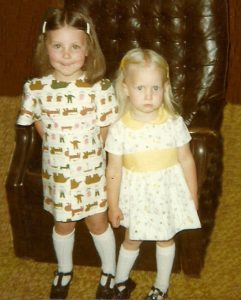 As my daughter, Amy Royce’s birthday approached, I found myself looking back on her childhood. While Amy was my bigger baby, 7 pounds as opposed to her older sister, Corrie Petersen, who weighed 6 pounds 2½ ounces, it turned out that she had put all her effort into her pre-birth weight, and she slowed down after that…only reaching 4 feet 10 inches by adulthood. She might be little…a midget if you ask her husband, Travis, but Amy is feisty, She always has been. I think it was self defense, from her toddler years when the other kids thought she was a baby doll, and wanted to pick her up an carry her around. Of course they only tried once. The blood curdling screams that came out of my girl were enough to cure those kids of any desire to carry Amy ever again. The funny thing is that, while she had a temper, Amy was also a very happy toddler…most of the time. Just don’t assume that you could pick her up, hahaha!! As long as she felt safe, Amy was a bubbly little girl, who rarely walked, but rather somersaulted or cartwheeled around the room. Walking was just too boring, I guess.
As my daughter, Amy Royce’s birthday approached, I found myself looking back on her childhood. While Amy was my bigger baby, 7 pounds as opposed to her older sister, Corrie Petersen, who weighed 6 pounds 2½ ounces, it turned out that she had put all her effort into her pre-birth weight, and she slowed down after that…only reaching 4 feet 10 inches by adulthood. She might be little…a midget if you ask her husband, Travis, but Amy is feisty, She always has been. I think it was self defense, from her toddler years when the other kids thought she was a baby doll, and wanted to pick her up an carry her around. Of course they only tried once. The blood curdling screams that came out of my girl were enough to cure those kids of any desire to carry Amy ever again. The funny thing is that, while she had a temper, Amy was also a very happy toddler…most of the time. Just don’t assume that you could pick her up, hahaha!! As long as she felt safe, Amy was a bubbly little girl, who rarely walked, but rather somersaulted or cartwheeled around the room. Walking was just too boring, I guess.
Amy and Corrie spent lots of time together as little girls, because we lived in the country. What I saw through that time was two little girls who were best friends. While there were little fights, they would also protect each other no matter what. Their closeness is harder these days, because they live so far apart, but they love each other very much. Many people commented to me when they were little, that they got along so well. They just couldn’t believe that sibling love my girls had. I am so proud of their relationship, then and now.
As I look at the life Amy has built now, I am very proud of her. Amy is a peace-loving person, and her lifestyle notes that very well. Amy loves the rainforest area of Washington state, and the beaches that go along with it. The area she lives in just feels peaceful, especially when she and Travis head out to Birch Bay to watch the sunset. Even now, while they are required to stick closer to home, their back yard has become a sanctuary for them. Amy has roses, calla lilies, and a variety of other gorgeous flowers, enhancing the beauty of her back yard as well as the fragrant smells. Travis loves yard work too, especially mowing the lawn, and so their grass 
 is beautiful. The built a patio and set up a table and chairs with an umbrella, and a fire pit, to enhance the relaxing effect of their yard. It makes me very happy to know that she and her family have such a beautiful place to relax and reconnect with friends and family. Bob and I love to go for visits, because it give us a chance to enjoy the area that has drawn Amy’s family to its beauty.
is beautiful. The built a patio and set up a table and chairs with an umbrella, and a fire pit, to enhance the relaxing effect of their yard. It makes me very happy to know that she and her family have such a beautiful place to relax and reconnect with friends and family. Bob and I love to go for visits, because it give us a chance to enjoy the area that has drawn Amy’s family to its beauty.
Amy is on vacation this week, and so is home relaxing. She is an account manager for Rice Insurance in Bellingham, Washington. She, like so many people, worked from home through much of the pandemic, but now she is back at the office. At home or at the office, Amy is a hard working insurance agent, and she stayed very busy. Today is Amy’s birthday. Happy birthday Amy!! Have a great day!! We love you!!
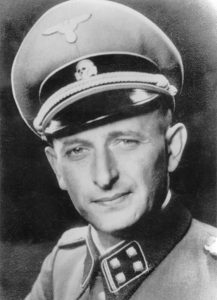 As World War II was winding down, and it was becoming abundantly clear that Nazi Germany was not going to win, the “brave” leaders of the Third Reich began to make plans to run out on their Army, leaving them to take the fall alone. The Nazi leaders were given aliases, and plans were made to get them to Argentina, a country known for its lax immigration policies. The Nazis planned to regroup in Argentina and try for world domination again at a later date.
As World War II was winding down, and it was becoming abundantly clear that Nazi Germany was not going to win, the “brave” leaders of the Third Reich began to make plans to run out on their Army, leaving them to take the fall alone. The Nazi leaders were given aliases, and plans were made to get them to Argentina, a country known for its lax immigration policies. The Nazis planned to regroup in Argentina and try for world domination again at a later date.
Hitler’s hatred for Jews, like any racism was not logical. The Jewish people had done nothing to Hitler or any other German person. This was just a sick personal idea of Hitler’s. It comes from an intolerance to the differences that are naturally occurring in humans, and why would we want to all look the same anyway. It makes no sense at all. Different people have different things to contribute to any society, but Hitler could only see his own twisted idea of a perfect person…odd, when you consider the fact that Hitler would not have fit into his own mold of “perfect” at all. Hitler had a number of conditions that would have, by his own standards, have precipitated his death by the very people who enforced Hitler’s laws.
The man Hitler put in charge of his “final solution of the Jewish question,” Adolf Eichmann, was a man who’s racism and evil personality were quite likely equal to Hitler’s. I have no idea how anyone could plan the murder  of millions of people, of any race, without that person being evil itself. Eichmann was just that. He knew what he was doing, and he relished the idea of “being a god” over those people’s lives…choosing who lives and who dies. Most of us dislike jury duty, because we don’t want to make such decisions for fellow citizens, but Eichmann loved it…thrived on it.
of millions of people, of any race, without that person being evil itself. Eichmann was just that. He knew what he was doing, and he relished the idea of “being a god” over those people’s lives…choosing who lives and who dies. Most of us dislike jury duty, because we don’t want to make such decisions for fellow citizens, but Eichmann loved it…thrived on it.
Eichmann was born in Solingen, Germany, in 1906. Eichmann joined the Nazi’s elite SS (Schutzstaffel) organization in November 1932. The members of the SS came to have broad responsibilities in Nazi Germany, including policing, intelligence, and the enforcement of Adolf Hitler’s anti-Semitic policies. Eichmann was good at his job, and steadily rose in the SS hierarchy. When the Nazis annexed Austria in 1938, Eichmann was sent to Vienna, His mission…rid the city of Jews. He set up an efficient Jewish deportment center and in 1939 was sent to Prague on a similar mission. That year, Eichmann was appointed to the Jewish section of the SS central security office in Berlin. I don’t know how he could have looked himself in the mirror.
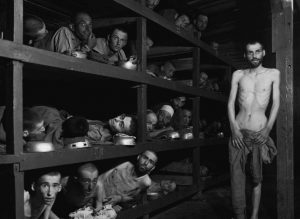 After the war, Eichmann was captured by US troops. Somehow, he managed to escape from the prison camp in 1946, before the Nuremberg International War Crimes Tribunal. Taking an assumed identity, Eichmann traveled between Europe and the Middle East. Finally, in 1950 Eichmann arrived in Argentina. In 1957, a German prosecutor secretly informed Israel that Eichmann was living in Argentina. Time had not forgiven the crimes Eichmann had committed. Agents from the Mossad, Israel’s intelligence service, were deployed to Argentina, and in early 1960 they finally located Eichmann. He was living in the San Fernando section of Buenos Aires under the name of Ricardo Klement. He was taken back to Israel, and on May 31, 1962, he was finally hanged for his horrific crimes against humanity.
After the war, Eichmann was captured by US troops. Somehow, he managed to escape from the prison camp in 1946, before the Nuremberg International War Crimes Tribunal. Taking an assumed identity, Eichmann traveled between Europe and the Middle East. Finally, in 1950 Eichmann arrived in Argentina. In 1957, a German prosecutor secretly informed Israel that Eichmann was living in Argentina. Time had not forgiven the crimes Eichmann had committed. Agents from the Mossad, Israel’s intelligence service, were deployed to Argentina, and in early 1960 they finally located Eichmann. He was living in the San Fernando section of Buenos Aires under the name of Ricardo Klement. He was taken back to Israel, and on May 31, 1962, he was finally hanged for his horrific crimes against humanity.

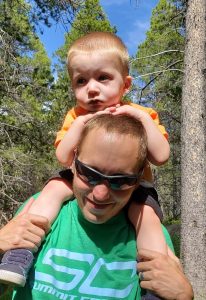 My great grand nephew, Jaxx Harman is the youngest on my grand nephew Jake Harman and his wife Melanie’s three children. Jaxx is their only son, and having two older sisters can be awesome, or it can be a fight. Thankfully for Jaxx, he has great sisters. While there are those minor disagreements that all siblings have, they are pretty great to have around. For most of his life, his older sisters have been showing him the ropes of life, but Jaxx is getting to be a big boy now, and his own attitude is starting to present itself into the family picture. A boy with two older sisters has to get a handle on things before he gets too old, or they girls will push him around.
My great grand nephew, Jaxx Harman is the youngest on my grand nephew Jake Harman and his wife Melanie’s three children. Jaxx is their only son, and having two older sisters can be awesome, or it can be a fight. Thankfully for Jaxx, he has great sisters. While there are those minor disagreements that all siblings have, they are pretty great to have around. For most of his life, his older sisters have been showing him the ropes of life, but Jaxx is getting to be a big boy now, and his own attitude is starting to present itself into the family picture. A boy with two older sisters has to get a handle on things before he gets too old, or they girls will push him around.

Jaxx can’t have that. At the grown up age of three, he has to start asserting himself…or at least that’s what he has decided. Jaxx is all boy, and like many boys, he loves to wrestle, fight, and in general, be ornery. According to his mom is a little monkey. I can totally picture that too. From jumping on the bed…when Mommy isn’t looking, to climbing on every thing he can think of. It’s every “boy-mom’s” stressor. Still, when Jaxx looks at his mommy, her heart just melts too, because he is, after all, her boy and she loves him!! While Jaxx is ornery, he still is just so sweet too. It’s all part of his charm.
Jaxx loves his sisters, but he is the brother, and brothers must tease sisters. I think that is an unspoken rule!! His favorite argument with his sisters is, “Who is Daddy’s Favorite!!” Of course, his daddy loves each of his children equally, but it’s a fun argument to have, and Jaxx is just figuring that out. Jaxx may be the youngest child, but he can still give his sisters a “run for their money” when it comes to a fight. His sister Izabella fights and wrestles back, but his oldest sister, Alice takes it pretty easy 
 on him. I’m sure she worries about hurting him. That could change as he gets older, and bigger.
on him. I’m sure she worries about hurting him. That could change as he gets older, and bigger.
Jaxx is learning about manners and etiquette. He is very careful to follow some basic rules. If someone sneezes, Jaxx is quick to say, “Bless you.” He is learning things like please, thank you, and excuse me too. One of the very sweetest aspects of his personality, is that Jaxx loves to pray at bedtime and before eating. His little spirit loves God so much, and he wants to know more about Him. His parents are active in their church, and Jaxx wants to be just like them. He has good role models to follow after all. Today is Jaxx’s 3rd birthday. Happy birthday Jaxx!! Have a great day!! We love you!!
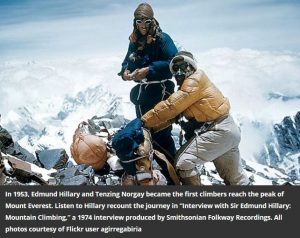 The news of June 2, 1953 was of Queen Elizabeth II’s coronation, but also of the hailed “good omen” for their country’s future…in reference to the first explorers to reach the summit of Mount Everest, which at 29,035 feet above sea level is the highest point on earth. The landmark assent to the top of the world culminated at 11:30am on May 29, 1953 when Edmund Hillary of New Zealand and Tenzing Norgay, a Sherpa of Nepal, made their final assault on the summit after spending a fitful night at 27,900 feet.
The news of June 2, 1953 was of Queen Elizabeth II’s coronation, but also of the hailed “good omen” for their country’s future…in reference to the first explorers to reach the summit of Mount Everest, which at 29,035 feet above sea level is the highest point on earth. The landmark assent to the top of the world culminated at 11:30am on May 29, 1953 when Edmund Hillary of New Zealand and Tenzing Norgay, a Sherpa of Nepal, made their final assault on the summit after spending a fitful night at 27,900 feet.
While the first summit of Mount Everest was an epic accomplishment, it was the words “fitful night” that drew my attention the most. I recently finished a novel by Harry Farthing called “Summit.” While his book was a novel, much of it was based on, if not actual events, actual conditions on the mountain. I am a hiker, and I like hiking to the highest mountains in an area, but let it be known that I am not a mountain climber, and I have no desire to hike through treacherous snow storms to reach the victory of the summit. Nevertheless, many people are obsessed with getting to the world’s highest peaks. Such was the case with Hillary and Norgay. They were determined to make it. I have no idea how prepared they were, but since their victory, and quite possibly before it too, there have been those who misjudged the mountain, the storms, and their own abilities…to their detriment.
While listening to “Summit,” I found myself cheering on the climbers, but also feeling the depths of the many defeats along the way. The biggest necessity on the mountain, is oxygen. At the base camp of Mount Everest, which is 17,500 feet, the air contains 50% of oxygen levels at sea level. At that level, without oxygen, people feel tired and light-headed and develop a headache. They might feel nauseous and even begin to vomit up everything they eat, and then just dry heave themselves to exhaustion. Of course, having oxygen tanks can change this situation into one that is manageable for survival. And that is just at the base camp, which is almost 12,000 feet below the summit. Between Camp 1, at 20,000 feet, and Camp 3, at 24,000 the oxygen levels drop to below 40%. At this point you are prone to hallucinate. Your whole body hurts. You can’t eat, sleep, and most people find breathing next to impossible. From here you operate on sheer willpower. You put one foot in front of the other, and keep moving, because if you do not, you will die. As you near the summit, at 29,035 feet, the air has less that one-third of the sea level oxygen, and can drop as low as 14%…a low level that was recorded in 1996. Twenty climbers lost their fight with the mountain, and their lives, that year. At this point, you should for all intents and purposes be dead. If you are still going, you are probably one of just a few people. On May 8, 1978, Reinhold Messner and Peter Habeler reached the summit of Mount Everest. They were the first men known to climb it without the use of supplemental oxygen. Two years later, on August 20, 1980, Messner again stood atop the highest mountain in the world, without supplementary oxygen. Cory Richards and Adrian Ballinger also summited the highest mountain in the world in 2017…Ballinger without supplemental oxygen. I don’t know how they did it. Those who have failed to make it to the summit, with or without oxygen, have said that they now know what dying feels like. I’m sure that doesn’t apply to all kinds of death, but certainly death on Mount Everest or any of the other mountains that are nearly as tall, it is like this. The symptoms of death by oxygen depravation quickly take their toll on the body. In the minutes before death, the pain must be excruciating. And then, still before death arrives, the body gives up, and feels no more. The  people that die on Everest are left on Everest. They climbers that go up, pass them along the way. It is a grim reminder that if you are not prepared, you might not be coming down.
people that die on Everest are left on Everest. They climbers that go up, pass them along the way. It is a grim reminder that if you are not prepared, you might not be coming down.
Mount Everest sits on the crest of the Great Himalayas in Asia, lying on the border between Nepal and Tibet. Called Chomo-Lungma, or “Mother Goddess of the Land,” by the Tibetans, the English named the mountain after Sir George Everest, a 19th-century British surveyor of South Asia. It is a majestic mountain, and one I might enjoy seeing…from an airplane…but it is not one that I would ever choose to climb, even though I love to hike. Nevertheless, you can’t help be to be in awe of those who would climb the mountain and receive that treacherous victory.
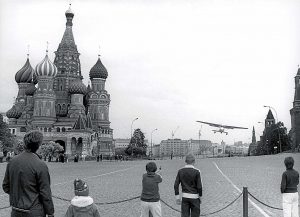 Every security detail prides itself in being able to stop any attack that might come toward the person or persons they are assigned to protect. Allowing a threat, any threat…be it a serious threat, or a minor prank…to get by the security check points, is seriously embarrassing and can be very dangerous. Never was this more widely publicized than on May 28, 1987, in Moscow.
Every security detail prides itself in being able to stop any attack that might come toward the person or persons they are assigned to protect. Allowing a threat, any threat…be it a serious threat, or a minor prank…to get by the security check points, is seriously embarrassing and can be very dangerous. Never was this more widely publicized than on May 28, 1987, in Moscow.
Early on that morning, a young man named Matthias Rust, a 19 year old amateur pilot from West Germany, took off from Helsinki, Finland and headed east. Rust flew his small Cessna airplane through 400 miles of Soviet airspace, somehow undetected, and landed it in Red Square by the Kremlin. The stunt was an immense embarrassment to the Soviet government and military…to say the least. I would think that “heads would roll” figuratively speaking. Red Square should be some of the most seriously protected airspace in the world, but here a 19 year old kid blew through the protections they had in place, and brazenly landed his small plane right in the middle of Red Square!!

Rust was not a known troublemaker. His mother said that he was a “quiet young man with a passion for flying.” He had no known political or social agenda when he took off from the international airport in Helsinki and headed for Moscow, so what was the purpose of his flight and subsequent illegal landing. He entered Soviet airspace, but was either undetected or ignored as he pushed farther and farther into the Soviet Union, but how was that possible. He arrived over Moscow, early that morning, circled Red Square a few times, and then simply landed…just a few hundred yards from the Kremlin. The people in the square, mostly curious onlookers and tourists, believed that Rust was part of an air show. They quickly surrounded him, probably wanting his autograph. Then, very quickly, Rust was arrested and taken to jail. The charges were severe. He was tried for violating Soviet airspace and sentenced to prison. I don’t know if the charge would have normally gained him a longer prison sentence, or if they took pity on him because of his age, but Rust served 18 months before being released…probably a relatively short sentence in retrospect.
The repercussions in the Soviet Union, however, were immediate. Soviet leader Mikhail Gorbachev fired his minister of defense, and the entire Russian military was humiliated by Rust’s flight into Moscow. The United 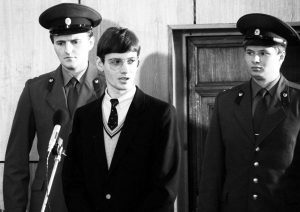 States officials didn’t make matters any easier either. They had a field day with the event. One American diplomat in the Soviet Union joked, “Maybe we should build a bunch of Cessnas.” The Soviet officials were not amused. Just four years earlier, the Soviets had been harshly criticized for shooting down a Korean Airlines passenger jet that veered into Russian airspace. Now, being able to stop one teenager’s “invasion” of the country, the Soviets became the laughingstocks. One Russian spokesperson bluntly declared, “You criticize us for shooting down a plane, and now you criticize us for not shooting down a plane.” No matter how you look at it, the situation was, to say the least, militarily embarrassing.
States officials didn’t make matters any easier either. They had a field day with the event. One American diplomat in the Soviet Union joked, “Maybe we should build a bunch of Cessnas.” The Soviet officials were not amused. Just four years earlier, the Soviets had been harshly criticized for shooting down a Korean Airlines passenger jet that veered into Russian airspace. Now, being able to stop one teenager’s “invasion” of the country, the Soviets became the laughingstocks. One Russian spokesperson bluntly declared, “You criticize us for shooting down a plane, and now you criticize us for not shooting down a plane.” No matter how you look at it, the situation was, to say the least, militarily embarrassing.

 It’s a strange thing to have something you have expected to last for a certain period of time, come to an abrupt end. You find yourself hanging in limbo, and it can become depressing, or I suppose it could become exhilarating, if it was something you didn’t really like anyway. Such has been the case with the 2020 school year, and the Covid-19 Pandemic that changed everything. Yes, the students are still in class, at least virtual class, but it really isn’t the same. I understand about homeschooling, but for parents who did not expect to make that commitment, it can be a daunting task. There is more to it than just the classwork too. Kids need structure, and having summer begin at Spring Break threw everyone into a tailspin. At first it just seemed like a really long Spring Break, then when the virtual classes started, they really started to miss the time spent with their friends and their teachers…even the tough ones. It seems that being in class with a teacher who makes you work for your grade, is preferable to being at home with your parents acting as your teacher, and you are in detention, even if you did nothing wrong.
It’s a strange thing to have something you have expected to last for a certain period of time, come to an abrupt end. You find yourself hanging in limbo, and it can become depressing, or I suppose it could become exhilarating, if it was something you didn’t really like anyway. Such has been the case with the 2020 school year, and the Covid-19 Pandemic that changed everything. Yes, the students are still in class, at least virtual class, but it really isn’t the same. I understand about homeschooling, but for parents who did not expect to make that commitment, it can be a daunting task. There is more to it than just the classwork too. Kids need structure, and having summer begin at Spring Break threw everyone into a tailspin. At first it just seemed like a really long Spring Break, then when the virtual classes started, they really started to miss the time spent with their friends and their teachers…even the tough ones. It seems that being in class with a teacher who makes you work for your grade, is preferable to being at home with your parents acting as your teacher, and you are in detention, even if you did nothing wrong.
At first, when it was just the extended Spring Break, and people were staying at home, no one really noticed that he kids were out of school. Then, as the weather got warmer, people got out on the trails and on the playgrounds, still “social distancing,” but getting a little bit of fresh air and removing themselves from the “cabin fever” that was quickly threatening their sanity. Suddenly, we became very aware that these kids should be in school. While the weather was warmer, it wasn’t summer yet. The school year of 2020 had only officially run for seven of the nine months it was supposed to. In fact, truth be told, school should still be in session…even now. And yet, while summer vacation is not here yet, the schools are closed. The 2020 school year hasn’t officially ended, and it isn’t officially in progress either. Parents are worried about the education their kids got this last quarter. Virtual classes were shorter that normal, and so the kids spent far less time in virtual class too. Nothing about the last quarter of school was normal. The kids didn’t always get to class, but did the homework, thinking it was enough, and for some of them, maybe it was, but what of the rest of them…the ones who needed that class time. Were they left hanging…time will tell, I guess.
The next school year is still up in the air too. There are schools who have said that they will open, and others who will continue the virtual program. That has parents up in arms too, because they are preparing to go back to work, and they will need someone to be home with their children while they work. A virtual teacher doesn’t really replace the safety of being in the classroom with a teacher in charge. All the “experts” have said that life is going to take on a “new normal,” and they may be right, but I think that if school doesn’t start back up next 
 school year, there will be a lot of parents who might need to start taking Prozac or something similar. Most parents find themselves impatiently awaiting the end of summer so the kids can go back to school, but this year was like the summer that never ended. The kids are just as bored, and there was no place to send them. The pools aren’t going to open, the rec centers either, and there is only so much a kid can do at the school playground. The walking paths are frequented by kids on bicycles and longboards, and even kids walking their dogs, but the reality is, these kids need to go back to school. They are designed to be social beings, not socially distanced.
school year, there will be a lot of parents who might need to start taking Prozac or something similar. Most parents find themselves impatiently awaiting the end of summer so the kids can go back to school, but this year was like the summer that never ended. The kids are just as bored, and there was no place to send them. The pools aren’t going to open, the rec centers either, and there is only so much a kid can do at the school playground. The walking paths are frequented by kids on bicycles and longboards, and even kids walking their dogs, but the reality is, these kids need to go back to school. They are designed to be social beings, not socially distanced.
 World War II was one time when the United States and Germany were absolutely not friends. The Nazi beliefs and the American beliefs were worlds apart. Nevertheless, not all Germans were Nazis, and hard to believe as that may be, it was true. Never was that more evident that at Castle Itter, a small fortification in Austria used by the SS during World War II as a prison for high profile detainees. On May 6, 1945, with the Third Reich collapsing against the Allied attacks, the German commander of Dachau, Wilhelm Weiter committed suicide. At that point, some of the Waffen SS soldiers retreated, and amid the chaos that followed, the opportunity presented itself, and a Yugoslav freedom fighter, Zvonimir Cuckovic, who was a prisoner at Dachau, escaped and went looking for some Allied troops to rescue the rest of the prisoners.
World War II was one time when the United States and Germany were absolutely not friends. The Nazi beliefs and the American beliefs were worlds apart. Nevertheless, not all Germans were Nazis, and hard to believe as that may be, it was true. Never was that more evident that at Castle Itter, a small fortification in Austria used by the SS during World War II as a prison for high profile detainees. On May 6, 1945, with the Third Reich collapsing against the Allied attacks, the German commander of Dachau, Wilhelm Weiter committed suicide. At that point, some of the Waffen SS soldiers retreated, and amid the chaos that followed, the opportunity presented itself, and a Yugoslav freedom fighter, Zvonimir Cuckovic, who was a prisoner at Dachau, escaped and went looking for some Allied troops to rescue the rest of the prisoners.
Hans Fuchs, who was a young student going to school nearby, remembers how Itter Castle was converted into a prison by the Nazis in 1943. He said, “We saw everything from our school window, a double barbed-wire fence…and floodlights so that the whole night was lit up like day.” Itter Castle, is an old castle, dating back to the Middle Ages. It was turned into a sub-unit of the Dachau concentration camp, and used for VIP prisoners, prominent politicians, and military figures that the Nazis wanted to use as bargaining chips. Famous prisoners 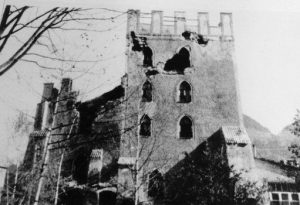 there included two former prime ministers of France, Edouard Daladier and Paul Reynaud, as well as the elder sister of Gen Charles de Gaulle, Marie-Agnes Cailliau.
there included two former prime ministers of France, Edouard Daladier and Paul Reynaud, as well as the elder sister of Gen Charles de Gaulle, Marie-Agnes Cailliau.
Cuckovic’s escape triggered one of the most curious battles of the conflict, but not in the way you might think. After he escaped, Cuckovic found an American armored column and got them to come with him. At the same time a Major Josef Gangl, who was an Austrian in the German Army, and had been collaborating with Austrian resistance in the closing days of the war, also intended to free the castle prisoners, but had decided instead to surrender with his men to the Americans. Gangl hated what was going on and knew that the Nazis were friends to no one. He could no longer stomach what he had been commanded to do. With the arrival of Cuckovic a hasty agreement took place. The major and his Wehrmacht troops would fight alongside the Americans against the SS guards.
The resulting battle of Castle Itter was not a major battle, just an amazing one. The SS faced not only their own countrymen and Americans, complete with a Sherman tank, but there were also Austrian partisans and French prisoners joining in. It was a wonderful show of the unifying effect the Allies had compared to the polarizing effect of the Nazis. The ensuing battle was not big, and in fact, a maximum of just 100 men were 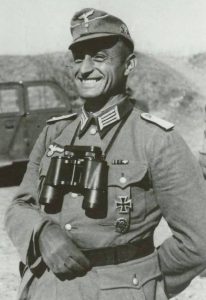 involved. Nevertheless, this battle was, without a doubt, vicious. The Sherman tank was destroyed and Major Josef Gangl was killed by a sniper. The thing that made this battle so unique, however, was that it was the only time the American army fought alongside the German army in all of World War II. The SS were handily defeated and quickly surrendered. The rest of the prisoners held at Castle Itter were released unharmed.
involved. Nevertheless, this battle was, without a doubt, vicious. The Sherman tank was destroyed and Major Josef Gangl was killed by a sniper. The thing that made this battle so unique, however, was that it was the only time the American army fought alongside the German army in all of World War II. The SS were handily defeated and quickly surrendered. The rest of the prisoners held at Castle Itter were released unharmed.
There have been times in many wars, when two soldiers made the conscious decision not to engage in battle, allowing both to live to fight another day. I suppose it would not be unheard of to have two opposing soldiers work together to defeat a common enemy, like maybe a bear or other wild animal, but for two army patrols of two opposing sides, to join forces against part of one sides army, is…well, unheard of. The battle at Castle Itter was just such a battle, and it is believed to be the only battle in the war in which Americans and Germans fought as allies.
 My niece, Cassie Iverson is a wife and mother of two children. She is also an activist for the causes she believes in. Most of them are causes for the protection of family and children. Cassie and her husband, Chris lived in a rented house while she was pregnant with their first child, their son, Lucas, who was born with Down Syndrome. They found out that the house had black mold, but the landlord wouldn’t do anything about it. Of course, there are no known ties between black mold and Down Syndrome, but there are many health problems that are associated with black mold. At that time, there seemed no way to get the satisfaction she sought from her landlord, so in the end, they move to a better home.
My niece, Cassie Iverson is a wife and mother of two children. She is also an activist for the causes she believes in. Most of them are causes for the protection of family and children. Cassie and her husband, Chris lived in a rented house while she was pregnant with their first child, their son, Lucas, who was born with Down Syndrome. They found out that the house had black mold, but the landlord wouldn’t do anything about it. Of course, there are no known ties between black mold and Down Syndrome, but there are many health problems that are associated with black mold. At that time, there seemed no way to get the satisfaction she sought from her landlord, so in the end, they move to a better home.
Cassie and Chris have fought through a number of health issued with Lucas, and they are very careful about his treatments. While many people would not agree with them, they are against vaccinations, because they feel that the ingredients in them are more dangerous than the disease the vaccination is trying to prevent. I don’t know which side of the coin my readers are on, and in this case, I have now desire to debate the vaccination issue, but rather I just want to say that it is my belief that each set of parents have the right to make that choice for their children, and that they should feel safe in doing so. I don’t think that anyone should be subject to  verbal attacks because they have differing opinions on this or really, any other of the hot button issues. The best thing about our liberties, is that we have the right to chose what is best for our family. The worst thing about our liberties, is that we risk making other people mad.
verbal attacks because they have differing opinions on this or really, any other of the hot button issues. The best thing about our liberties, is that we have the right to chose what is best for our family. The worst thing about our liberties, is that we risk making other people mad.
Whether you agree or not, we need people who will bring to light the other side of the coin, and that is what Cassie does. That takes courage in the current hostile climate in our nation. We face the same issues concerning the current Covid-19 Pandemic. There are so many views that no one knows what to think. That is why, we all have to make our own choices. Today is Cassie’s birthday. Happy birthday Cassie!! I hope you got to do something fun. Have a great day!! We love you!!

